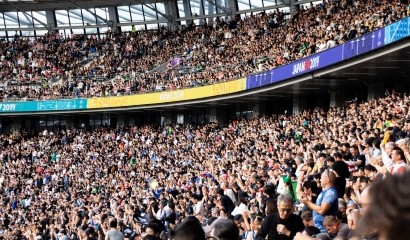EchoStar asset drop-down suggests prelude to aggressive LMEs, holders ponder litigation avenues
Investors are gaming out Charlie Ergen’s next move after the infamous telecom investor’s gambit this week shuffled assets across his now combined companies EchoStar and DISH Network.
Less than two weeks after the merger, the companies moved assets out of the reach of DISH creditors and launched a distressed exchange offer for two of DISH Network’s convertible bonds due 2025 and 2026.
Market participants now expect EchoStar will raise debt backed by DISH’s valuable wireless spectrum and address billions of dollars of upcoming maturities at DISH Network and subsidiary DISH DBS through a series of distressed debt exchanges and other liability management exercises.
Longer term, Ergen could be angling to combine TV business DISH DBS and rival DIRECTV in a deal that would turn EchoStar into a company focused on wireless spectrum and satellites, said a sellside analyst and sector advisor.
DISH creditors have already started to organize with one group advised by Milbank and Lazard. Other law firms like Kramer Levin are also speaking to holders of DISH notes.
The Milbank and Lazard group encompasses holders of debt across DISH’s capital structure, including the parent company, DBS, and the USD 3.5bn 11.75% senior secured notes backed by a portion of DISH’s spectrum, said a source familiar with the matter.
PIMCO, Capital Group, Fidelity Management, JPMorgan and Blackrock are the five biggest holders of DISH bonds, according to the sellside analyst.
Advisors to the holders are analyzing litigation avenues in response to the recent asset drop-down, said two additional sources familiar with the matter. Some creditors are examining sending a default letter to the company, Bloomberg previously reported.
However, some investors believe that Ergen’s move was well orchestrated to keep the threat of bankruptcy at bay, not to jeopardize his equity interests in the companies that he founded.
“This is not Lumen/Level 3,” said the sellside analyst, noting that Lumen creditors sent a letter threatening to call an event of default last year. “You have a much bigger adversary here.”
EchoStar has engaged Houlihan Lokey and White & Case to explore what it calls strategic alternatives. Both advisors have considerable restructuring experience.
Spectrum leverage
As part of the asset shuffle, DISH Network moved some of its unencumbered wireless spectrum licenses into a new subsidiary of parent EchoStar and redirected a tranche of an intercompany loan made by DISH DBS to DISH Network so that EchoStar is now the lender.
EchoStar can now borrow against the spectrum to raise billions of dollars at the new EchoStar box and against the unencumbered spectrum that remained at DISH, said the second source familiar.
Borrowing would be expensive and dependent on investors’ valuation of the spectrum but some believe the assets have value and would be open to providing financing, said a second sector advisor. DISH paid an 11.75% coupon to borrow against spectrum at a 35% loan to value for the USD 3.5bn offering.
Proceeds could address the March maturity of a USD 995m 2.375% convertible note, the analyst said. Funds raised could also help finance DISH’s expensive buildout of a wireless cellular network in the US, other sources said.
DISH has invested over USD 30bn in wireless spectrum licenses and has the option to purchase more from T-Mobile, according to SEC filings.
Ergen’s efforts to build and maintain his spectrum holdings at DISH have long attracted controversy. A decade ago, he faced accusations from LightSquared – the company now known as Ligado – and its owner, Harbinger Capital Partners’ Phil Falcone, who claimed Ergen had used a series of shell companies to secretly buy up the company’s debt in a scheme to acquire its valuable wireless spectrum on the cheap.
The parties ultimately settled, after months of scorched earth litigation tactics.
DISH is currently facing an ongoing lawsuit in the United States District Court for the District of Columbia over allegations it had falsely set up “sham companies” to bid for spectrum in an FCC auction that was designed to help smaller businesses get into the wireless market.
Depositions are scheduled next month in the False Claims Act case, brought by the Vermont National Telephone Company, with potential liabilities ranging between USD 1bn and USD 6bn, according to a source familiar with the case.
Liability maneuvers in the dark
The recent transactions also position EchoStar to capture a discount in the existing bonds by offering holders an opportunity to exchange into new notes potentially secured by unrestricted subsidiaries, said one of the sources familiar, a trader and the analyst.
“The asset drop-down was so aggressive and various constituencies who bought into it will make offers and there will be multiple transactions, not like one Lumen-style transaction where they fold everything into one LME,” said the second source familiar.
Heading into the weekend, investors expected EchoStar would redeem DISH’s March 2024 convertible notes and run exchanges for the November 2024 unsecured notes issued by DBS and the 2025 convertible notes, the trader said. Some estimated that EchoStar will propose an exchange in the mid-to-upper 70s range for the 2025 converts, he added.
Instead, DISH late Friday offered holders of the 2025 convert and a USD 3bn 3.375% convertible note due 2026 the opportunity to exchange into new 10% senior secured notes due 2030 backed by DISH’s AWS-4 spectrum at 61 and 51 cents on the dollar, respectively.
The USD 1.96bn 0% convertible notes due 2025 traded Friday afternoon at 67.95, while the USD 2bn 5.875% senior unsecured notes due November 2024 changed hands at 91, down from 94.5 at the start of the week, according to MarketAxess. The USD 995m 2.375% convertible notes due in March traded at 97.35.
Longer-dated bonds issued by DBS have moved even lower with DBS’s USD 1.5bn 5.125% senior unsecured notes due 2029 trading at 37.5, down from 49.5 prior to the announcement. Overall, DBS has USD 11.74bn in debt.
EchoStar disclosed Tuesday that it had formed several unrestricted subsidiaries at DBS, including one that holds 3 million DISH TV subscribers and several that encompass its SLING brand TV service. DBS has been losing customers in both segments, ending September with 6.72 million DISH TV subscribers and 2.12 million SLING subscribers.
Cash flow generated at DBS will be used to “de-lever its balance sheet, enhance its debt maturity profile and for general corporate purposes,” the company said.
TV merger
Maneuvers at DBS are likely a precursor to Ergen making another run at combining its TV business with DIRECTV, the rival satellite provider backed by telecom giant AT&T and financial sponsor TPG, said the sellside analyst and the first sector advisor.
“He always has another card up his sleeve,” said Jason Bernstein, co-founder of Asterisk Capital, a debt advisory boutique that advises other satellite companies in the space. He added that an open question is whether DBS holds enough value to cover the DBS bonds, even at current market prices, or if DBS would have to restructure to facilitate a merger.
Ahead of a deal, Ergen likely wants to convince some DBS holders to equitize their position and offer to exchange notes trading in the 40s for new bonds in the 60s, the sellside analyst said. “The lower he can drive those bonds, the more discount he will capture,” he added.
Antitrust authorities successfully challenged the merger of DISH and DIRECTV in 2002, but speculation a deal could be rekindled has percolated for years on the argument that regulators would be more open to a deal today since satellite TV is a declining industry.
While DISH worked to close the merger with EchoStar, Ergen denied he planned to combine DISH with DIRECTV at this time.
“We’ve got a ton of stuff in terms of combining the companies and the management teams and making sure we don’t wait on synergies,” Ergen told investors in November. “So, we just don’t have any plans for DirecTV based on that.”
AT&T, meanwhile, has reportedly been evaluating alternatives for its 70% stake in DIRECTV, according to Bloomberg News. AT&T is permitted to sell its position starting in August 2024 under the 2021 deal with TPG that valued the company at USD 16.25bn, or roughly 4x 2020 EBITDA.
EchoStar and DIRECTV did not return requests for comment.










